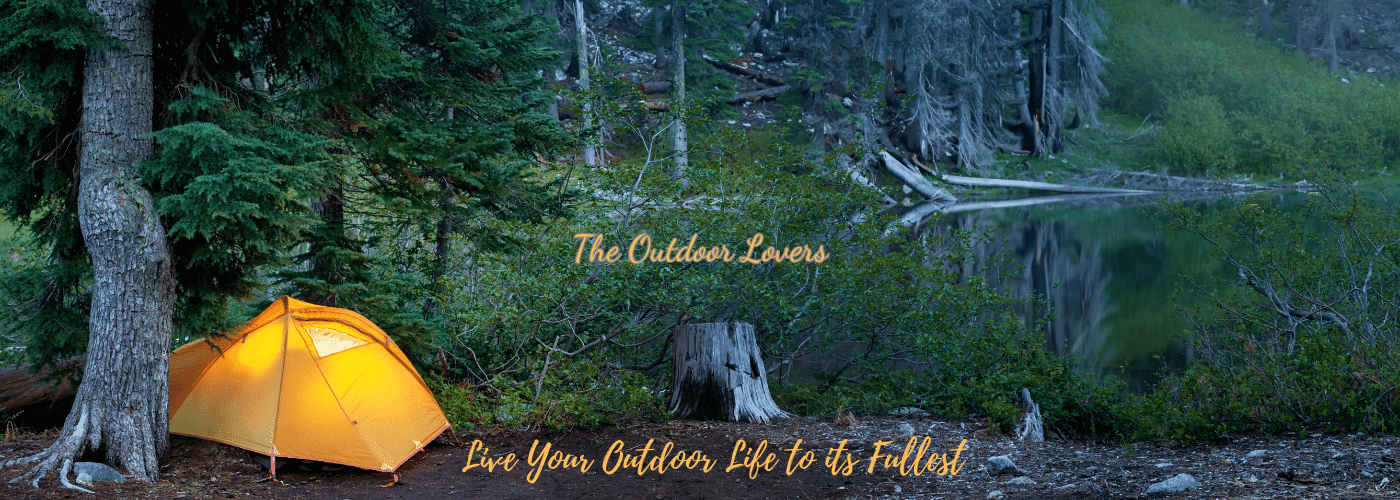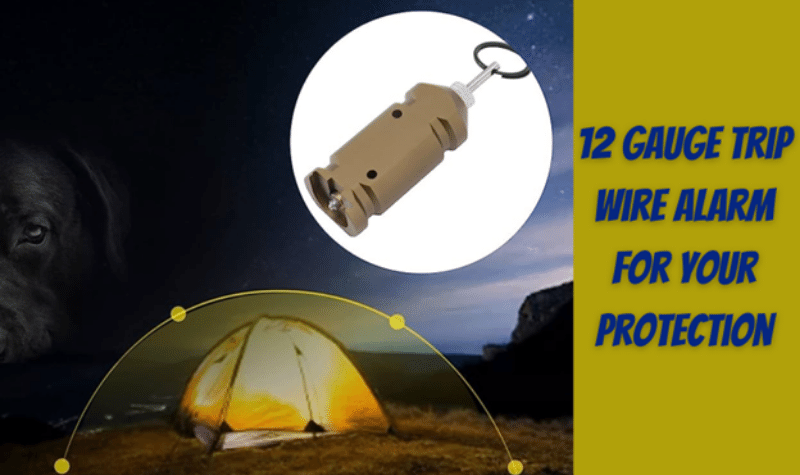The allure of camping lies not only in the freedom of escaping the hustle and bustle of modern life but also in embracing the primal connection with nature. However, amidst the tranquility and beauty, it’s crucial to prioritize safety, especially when venturing into remote or unfamiliar wild camping places.
Installing a 12 gauge trip wire alarm around your camping site is a simple but effective solution. This almost invisible security system will notify you when an intruder or animal enters your site, allowing you time to secure yourself or escape to a safe area.
You can set up this easy warning system if you have an hour to spare and less than $50. It gives valuable peace of mind. Survival is ultimately determined by your ability to protect yourself and your family. A 12-gauge trip wire alarm ensures you are aware and prepared for anything coming your way.
What Is a 12 Gauge Trip Wire?
A 12-gauge trip wire is a type of booby trap or alarm system typically used for security purposes. It consists of a wire or cord stretched across a specific area and connected to a triggering mechanism. When the wire is tripped or disturbed, the mechanism is activated, setting off an alarm or triggering another action.
How Does a 12-Gauge Trip Wire Work?
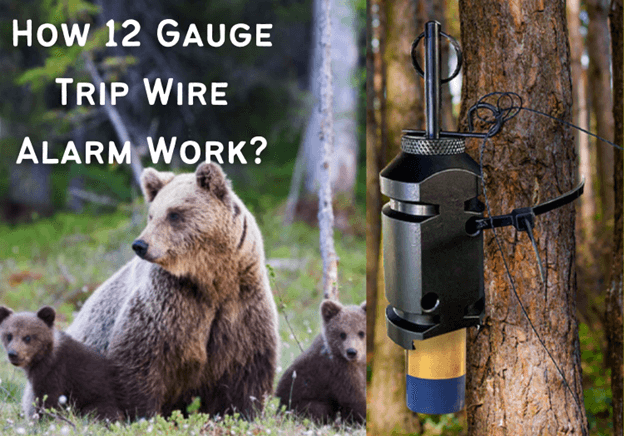
The .12 Gauge Trip Wire Alarm is a simple, yet effective camping tool designed to enhance security and safety in the great outdoors. The device operates on a basic principle: a tripwire mechanism connected to a 12-gauge shotgun shell. When activated, the tripwire is stretched across a designated path or around a specific area, and if triggered by any movement, it releases the firing pin on the shotgun shell. This, in turn, causes the shell to discharge with a loud and attention-grabbing bang.
The primary function of the .12 Gauge Trip Wire Alarm is to alert campers of potential threats or intruders, providing an audible warning that can deter animals or signal the presence of unwanted visitors.
While not intended to cause harm, its startling noise can startle and discourage approaching animals or potential intruders, creating a safe perimeter around the campsite. Due to its simplicity and ease of use, this camping essential has become a popular choice for those seeking an added layer of protection during their outdoor adventures.
Understanding Wildlife Signs
A 12-gauge trip wire alarm may save your life when you’re out in the bush. Paying attention to animal signs in the area can help you assess whether you need to set up an alarm for your protection.
When animals roam, forage, and hunt, they leave traces of their activities behind. Tracks, scat, fur, nests, or dens are all things to look for. Large predators like bears and mountain lions will leave their imprint. An alert system is strongly suggested if you see these carnivores near your campground.
Tracks provide a variety of data. Determine the species by looking at the size, quantity, and pattern. Bears, for example, have five toes and a unique heel pad pattern. Mountain lion footprints contain five toes as well. However, they are asymmetrical in design. The more recent the animal went through, the fresher the tracks. Cubs or a group of animals may leave traces in the same direction.
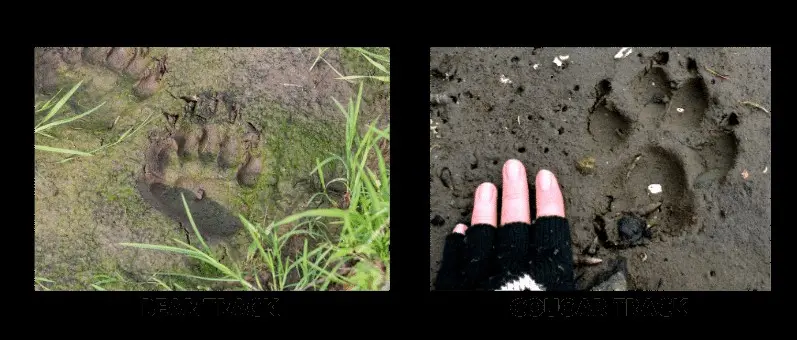
Scats or droppings may also provide information about the kind of animals that live in the region. Bear scat contains a lot of plant stuff, such as berries, nuts, and grass. Mountain lion scats are often found with hair and bone pieces from their victim. Scat signifies a territory or hunting zone, so be aware.
Another sign to look out for is hair caught on trees or plants. When most animals travel through thick vegetation, they leave hair behind. Check the color, length, and texture to see whether it’s from a bear, mountain lion, or other species.
If you see these signs near your camp, immediately install a trip wire alarm system around the perimeter. It might save you from falling victim to another beast all night. Your safety depends on being aware of the animal signs near you. Don’t ignore the advice; instead, behave responsibly. When trekking into the wilderness, a 12-gauge trip wire alarm may be your greatest protection.
For Info on Bear Spray: Click Here!
Choosing A Strategic Tent Position
It is vital to your safety and security to put your tent in an optimal spot. In case of danger, you want a defensive site with excellent visibility and several escape routes.
Find Natural Protection
Look for natural barriers such as thick bushes, fallen trees, huge rocks, or steep slopes that are a barrier between you and any dangers. Ensure the place has adequate visibility so that anybody arriving from a distance can be seen. Before assembling your tent, clear the trash area and ensure there is no evidence of recent flooding.
Avoid Obvious Areas (if needed)
Avoid regular campgrounds, trails, highways, and other apparent locations where people frequently travel or meet. These spots are more accessible, and you are more likely to be seen. If you want to be undetected, you should travel somewhere distant. Find a clean area that humans haven’t disturbed in a dense bush or woodland.
Have Multiple Escape Routes
You’ll want options for getting away fast if you’re in danger. Choose a location that has at least two or three potential escape routes. Look for wildlife trails, shallow stream beds, or other natural routes that allow you to get in and out of the area easily, clear significant barriers from these paths so you may leave quickly if necessary.
Elevation Is Key
Higher land is easy to defend because you can view the surrounding region and notice potential risks from a distance. Look for a naturally high spot, such as a rocky outcrop, hilltop, or ridge.
Check that any higher land nearby doesn’t block your vision or give shelter for someone trying to sneak up on you. Without natural heights, you may build a raised platform for your tent out of garbage, logs, rocks, or other items.
Consider The Season
The season also plays a factor in selecting an appropriate tent location. Avoid low-lying places that may flood or become muddy if there is substantial rain in the spring or autumn.
In the winter, search for a site out of the wind and elements with natural tree cover or a wind-blocking barrier, such as a huge rock. Find a site with lots of shade in the summer to prevent sweating throughout the day.
Choose a tent site with care and planning for your own protection. Consider natural protection, avoiding visible spots, having numerous escape routes, gaining high ground if feasible, and considering seasonal factors. Take the time to choose the best strategic site for your tent.
Wildlife Safety Measures

Wildlife protection is critical to the well-being of both people and animals. Consider the following crucial measures:
Properly storing food and fragrant things: Keeping food and aromatic goods helps keep animals away from your campground. Use airtight containers or bear-resistant canisters to keep food, toiletries, and other aromatic things.
Bear canisters and bear-resistant sacks for hanging food: When camping in regions where bears or other animals may be drawn to food, hang your food high in trees or use bear-resistant canisters. This keeps the food safe and out of reach of animals.
Using bear spray and understanding how to use it: Bear spray is a very efficient deterrent against bear encounters. Carry bear spray in a convenient position and learn how to use it correctly. You should read the manual and practice using it before needing it.
Keeping your campground clean helps avoid attracting animals: It is important to keep your campground clean to avoid attracting animals. Clean cooking equipment and surfaces, remove the garbage and don’t leave food crumbs about.
Making a sound to warn animals of your presence: Making noise when trekking or moving through places renowned for wildlife presence might help notify animals of your presence, minimizing the risk of being surprised by them. This may be done by conversation, singing, clapping, or bells.
For Info on Bear Spray: Click Here!
12 Gage Trip Wire Alarm By Trip Alarm Co.
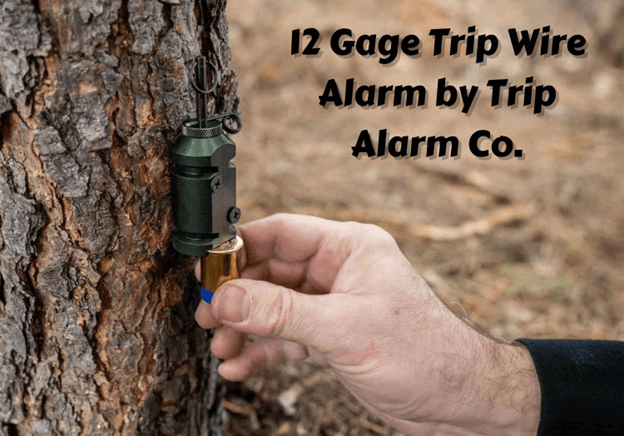
The Trip Alarm Co. 12 Gauge Trip Wire Alarm is an excellent approach to improving the security of your campsite, camp or property without breaking the bank. This simple-to-install alarm system encircles your area with tripwires constructed of high-tensile wire. Anything that damages the wire will immediately trigger an ear-piercing alarm or gunshot alerting you of intruders.
Simple Yet Effective Protection
The 12-gauge Trip Wire Alarm is simple to install. Place the given stakes around the area’s perimeter to be protected, thread the tripwire across the stakes, and attach the wire to the alarm unit. The alarm will go off instantly if somebody breaches the wire. The loud gunshot will frighten away most attackers while notifying you and your neighbors.
The 12-gauge wire is virtually tough to detect, particularly at night, so intruders will be uninformed of its presence once the alarm goes off. This low-cost warning system protects your campsite, yard, garden, farm or structures 24 hours a day, seven days a week.
Reliable And Weather-Resistant
This alarm system has been created to withstand weather conditions. The 12-gauge tripwire resists corrosion, and the alarm unit is encased in a waterproof container, enabling it to be used outside in all-weather situations. The alarm does not need electricity and is ready to use immediately.
Adjustable Sensitivity
The alarm’s sensitivity may be modified to meet your specific needs. Reduce the sensitivity in high-traffic areas where dogs or animals may cause false alerts. Increase the sensitivity so that even the smallest disturbance triggers the alarm for optimum security in remote areas. This adjustable sensitivity reduces annoying alerts while protecting you when you need it the most.
Peace Of Mind 24/7
The 12 Gage Trip Wire Alarm is an excellent investment due to its reasonably high protection. Whether you’re at your camp or further away, this alarm system will notify you if an intruder enters the protected area, allowing you to take necessary action.
Multiple alarm units may be used in conjunction to provide complete perimeter security. Install this simple, low-cost tripwire security system to give yourself peace of mind. Investing in your protection and the safety of your loved ones is well worth it.
Additional Resources
If you are looking for more tutorials, walkthroughs and troubleshooting about camping and enjoying the outdoors, here are some additional posts to check out:
Conclusion
It is essential to guarantee the safety of people and animals in the wilderness. We may reduce possible disputes and encourage peaceful coexistence by taking proper precautions. It is essential to be prepared and aware of your surroundings to mitigate possible dangers and prevent harmful interactions with animals.
Understanding the local wildlife, knowing the safety requirements, and having the right tools and information are all part of it.
Following the previously listed safety practices, such as properly storing food, using bear-resistant boxes, having bear spray, keeping a clean campsite, and making noise to warn animals, dramatically improves your safety and helps in protecting wildlife.
The Trip Alarm Co. 12 Gage Trip Wire Alarm is an excellent method to increase security in your area without bursting the bank. This simple-to-install alarm system encircles your area with tripwires constructed of high-tensile wire. If the wire is tampered, an immediate and very loud alarm will sound.
Using a 12 gauge trip wire alarm is a sensible precaution to take for the safety of your loved ones. You’ll sleep better at night knowing you have an alarm system in case an animal or someone try to enter your space uninvitedly. If you receive an unwelcome guest, they’ll be surprised when that alarm rings. Keep yourself safe out there! Be Safe and Happy Camping.!
